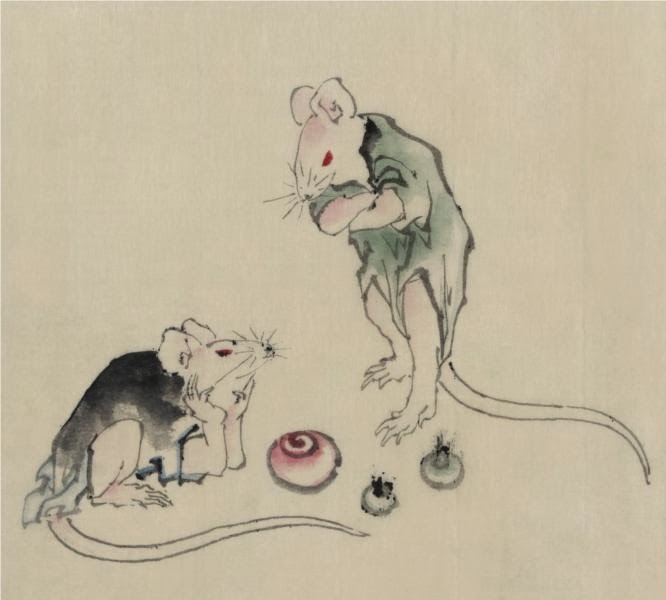by Nina
 |
| Two Mice by Hokusai |
Recently a friend sent me a link to this video on stress by Dr. Kelly McGonigal because she thought I might find it interesting. Well, I started to watch it thinking I might share it on Facebook, but I was so troubled by what Dr. McGonigal said during the first minute that I switched it off. What Dr. McGonigal said—and perhaps she was just being dramatic—was that she had entirely changed her mind about how stress affects our health because of a study she read that showed that people only got sick from stress when they believed that stress was bad for them.
I just found that hard to believe! Now I know Kelly’s a Stanford psychologist and all, but I’ve been married to a scientist for a very long time so I tend to be very skeptical about some of these types of studies. So I decided to do a reality check with said scientist (for our newer readers, that would be Brad Gibson, a medical researcher at the Buck Institute for Research on Aging). I told him about what she claimed, and asked if that was possible.
“It’s BS,” he said firmly. “After all, most of the studies on the effects of stress have been done on mice.”
I understood his point: they didn’t exactly divide the mice into two groups, one who they told that stress was bad for mice and the other who they just stressed out without telling them that stress was bad.
And just as I was starting to wonder how you stress out a mouse, he said, “For example, in some studies they make it impossible for a mouse to create its little nest.”
I thought that was fascinating—a mouse needs to go off by itself for periods of time into its cozy little place in order to stay sane.
Brad went on, “If they disrupt a mouse’s ability to nest, it becomes very stressed out and there are obvious chemical changes they can measure. If they continue the disruption for only a short period of time, the mouse’s chemical balance will return to normal. However, if this goes on for a very long period of time, the imbalance can become permanent.”
Well, we’ve been talking on this blog about the negative effects of chronic stress since the early days (see Chronic Stress: An Introduction and Stress, Your Health and Yoga). But what this particular story about the experiments on mice made me think of was my own yoga practice. Yes, my regular home practice is my refuge, not unlike the little nest a mouse makes for itself to retreat to. Spending that quiet time alone, feeling my body and my breath, almost never fails to make me feel better than before I practice. And when I am experiencing stressful events—that is unavoidable of course, and maybe the point Kelly McGonigal was trying to get to—I tailor my practice to calm and comfort myself. And this yoga as a “refuge” concept is one of the main reasons I’m on a mission to encourage people to start practicing yoga at home, even just for short sessions.
Restorative yoga in particular, with all the blankets and pillows and comfy bolsters, is a little bit like nesting, isn’t it? If you’re not familiar with restorative yoga, read Restorative Yoga: An Introduction and see Mini Restorative Practice for a mini restorative practice that is suitable for most everyone. Even just a brief session of Supported Child’s pose can be extremely calming and comforting.

P.S. I suppose that some of you will or have already watched the entire video, and may want to straighten me out about what Dr. McGonigal’s real message was. Feel free! But this post isn’t really a response her video so much as a little tale of mice and men.
Follow Yoga for Healthy Aging on Facebook ° To order Yoga for Healthy Aging: A Guide to Lifelong Well-Being, go to Amazon, Shambhala, Indie Bound or your local bookstore.


I love Kelly McGonigal! I saw that video a while back and thought it was fascinating–but it IS hard to believe that everything we thought we knew about stress is wrong! Thanks for opening up the dialogue. Even IF stress isn't as bad for us as we think, it's still nice to have a refuge.
Thanks for commenting, Erica. I can tell you for sure that I'm much healthier emotionally when I'm not constantly stressed out. That doesn't mean avoiding all situations that might be stressful; it just means having the tools to keep myself centered as I face both the joys and difficulties of life.
I too love Kelly McGonigal. The way I understood it, the studies she quotes were from research on human beings. I think sometimes we do stress ourselves out by believing we are "so stressed". We can totally "wig" ourselves out. I know people that get very stressed over something that to another person is almost nothing. So I can believe that our perception of our stress can can add another dimension and that may be what she is getting at. I loved her ideas about connection and when we are doing something meaningful, even if stressful, that is better than the avoidance of stress. I also believe that our yoga practices help us to perceive our stresses in a much calmer light, it gives us that pause to see…"yes, I can handle this now".
Thanks for your comment, Anon. Well, perhaps Kelly was just being dramatic. Or she was previously confused about something we all already understood. Because this is not a new idea. No one has ever said anything about avoiding stressful situations just avoiding getting stressed out. In fact, that idea is very old. In the Bhagavad Gita, Krishna tells Arjuna that he must do his "work," which in his case is going into battle (Krishna is advising Arjuna as he is considering leaving the battlefield). He then tells him to cultivate equanimity (which he equates with yoga) by surrendering the fruits of his actions, that is, by doing his work without thinking about the results. That is a message I live by. But I would still argue that chronic stress, which means to me that your nervous system is constantly in stress mode–whatever is causing it–is still harmful to your health, whether you are aware of that or not. And there are people all over the world living in war, poverty, abuse, and so on, whose physical and mental health is being destroyed by their living conditions whether or not they even understand the concept of stress.
Very true! Thanks for that reminder. Let us know if Ms. McGonigal does any follow-up on her theme.
Well, I guess it’s better to call it “pressure” than “stress” because the latter has a negative connotation. According to a number of studies, pressure is good because it keeps you on your toes and forces you to be alert and creative; however, it becomes bad if not managed properly. When this happens, a person tends to panic, which I think is what Dr. McGonigal meant by viewing stress as harmful because instead of seeing problems as challenges, a person is seeing obstacles.
Jonathon Kelly